- Home
- Harlan Ellison
The Top of the Volcano: The Award-Winning Stories of Harlan Ellison Page 35
The Top of the Volcano: The Award-Winning Stories of Harlan Ellison Read online
Page 35
She reached down. There was a crawlspace under the floor.
Pulling the metal-rimmed vinyl plate, she slid into the empty square. Lying face-up, she pulled the square over the aperture, and nudged it gently till it dropped onto its tracks. It sat flush. She could see nothing where, a moment before, there had been the faintest scintilla of filtered light from the hallway. Annie lay very quietly, emptying her mind as she did when she slept in the doorways; making herself invisible. A mound of rags. A pile of refuse. Gone. Only the warmth of the baby doll in that empty place with her.
She heard the men crashing down the corridor, trying doors. I wrapped you in blankets, Alan. You must be warm. They came into the computer room. The room was empty, they could see that.
“She has to be here, dammit!”
“There’s gotta be a way out we didn’t see.”
“Maybe she locked herself in one of those rooms. Should we try? Break ’em open?”
“Don’t be a bigger asshole than usual. Can’t you hear that alarm? We gotta get out of here!”
“He’ll break our balls.”
“Like hell. Would he do anything else than we’ve done? He’s sittin’ on the street in front of what’s left of Beaddie. You think he’s happy about it?”
There was a new sound to match the alarm. The honking of a horn from the street. It went on and on, hysterically.
“We’ll find her.”
Then the sound of footsteps. Then running.
Annie lay empty and silent, holding the doll.
It was warm, as warm as she had been all November. She slept there through the night.
The next day, in the last Automat in New York with the wonderful little windows through which one could get food by insertion of a token, Annie learned of the two deaths.
Not the death of the man in the revolving door; the deaths of two black women. Beaddie, who had vomited up most of his internal organs, boiled like Chesapeake Bay lobsters, was all over the front of the Post that Annie now wore as insulation against the biting November wind. The two women had been found in midtown alleys, their faces blown off by heavy caliber ordnance. Annie had known one of them; her name had been Sooky and Annie got the word from a good Thunderbird worshipper who stopped by her table and gave her the skinny as she carefully ate her fish cakes and tea.
She knew who they had been seeking. And she knew why they had killed Sooky and the other street person: to white men who ride in stretch limos, all old nigger bag ladies look the same. She took a slow bite of fish cake and stared out at 42nd Street, watching the world swirl past; what was she going to do about this?
They would kill and kill till there was no safe place left to sleep in midtown. She knew it. This was mob business, the Post inside her coats said so. And it wouldn’t make any difference trying to warn the women. Where would they go? Where would they want to go? Not even she, knowing what it was all about…not even she would leave the area: this was where she roamed, this was her territorial imperative. And they would find her soon enough.
She nodded to the croaker who had given her the word, and after he’d hobbled away to get a cup of coffee from the spigot on the wall, she hurriedly finished her fish cake and slipped out of the Automat as easily as she had the document copying center this morning.
Being careful to keep out of sight, she returned to 51st Street. The area had been roped off, with sawhorses and green tape that said Police Investigation—Keep Off. But there were crowds. The streets were jammed, not only with office workers coming and going, but with loiterers who were fascinated by the scene. It took very little to gather a crowd in New York. The falling of a cornice could produce a minyan.
Annie could not believe her luck. She realized the police were unaware of a witness: when the men had charged the doorway, they had thrown aside her cart and goods, had spilled them back onto the sidewalk to gain entrance; and the cops had thought it was all refuse, as one with the huge brown plastic bags of trash at the curb. Her cart and the good sofa pillows, the cardboard flats and her sweaters…all of it was in the area. Some in trash cans, some amid the piles of bagged rubbish, some just lying in the gutter.
That meant she didn’t need to worry about being sought from two directions. One way was bad enough.
And all the aluminum cans she had salvaged to sell, they were still in the big Bloomingdale’s bag right against the wall of the building. There would be money for dinner.
She was edging out of the doorway to collect her goods when she saw the one in navy blue cashmere who had held Beaddie while they fed him Drano. He was standing three stores away, on Annie’s side, watching the police lines, watching the copy center, watching the crowd. Watching for her. Picking at an ingrown hair on his chin.
She stepped back into the doorway. Behind her a voice said, “C’mon, lady, get the hell outta here, this’s a place uhbizness.” Then she felt a sharp poke in her spine.
She looked behind her, terrified. The owner of the haberdashery, a man wearing a bizarrely-cut gray pinstripe worsted with lapels that matched his ears, and a passion flame silk hankie spilling out of his breast pocket like a crimson afflatus, was jabbing her in the back with a wooden coat hanger. “Move it on, get moving,” he said, in a tone that would have gotten his face slapped had he used it on a customer.
Annie said nothing. She never spoke to anyone on the street. Silence on the street. We’ll go, Alan; we’re okay by ourselves. Don’t cry, my baby.
She stepped out of the doorway, trying to edge away. She heard a sharp, piercing whistle. The man in the cashmere topcoat had seen her; he was whistling and signalling up 51st Street to someone. As Annie hurried away, looking over her shoulder, she saw a dark blue Oldsmobile that had been double-parked pull forward. The cashmere topcoat was shoving through the pedestrians, coming for her like the number 5 uptown Lexington express.
Annie moved quickly, without thinking about it. Being poked in the back, and someone speaking directly to her…that was frightening: it meant coming out to respond to another human being. But moving down her streets, moving quickly, and being part of the flow, that was comfortable. She knew how to do that. It was just the way she was.
Instinctively, Annie made herself larger, more expansive, her raggedy arms away from her body, the dirty overcoats billowing, her gait more erratic: opening the way for her flight. Fastidious shoppers and suited businessmen shied away, gave a start as the dirty old black bag lady bore down on them, turned sidewise praying she would not brush a recently Martinized shoulder. The Red Sea parted miraculously permitting flight, then closed over instantly to impede navy blue cashmere. But the Olds came on quickly.
Annie turned left onto Madison, heading downtown. There was construction around 48th. There were good alleys on 46th. She knew a basement entrance just three doors off Madison on 47th. But the Olds came on quickly.
Behind her, the light changed. The Olds tried to rush the intersection, but this was Madison. Crowds were already crossing. The Olds stopped, the driver’s window rolled down and a face peered out. Eyes tracked Annie’s progress.
Then it began to rain.
Like black mushrooms sprouting instantly from concrete, Totes blossomed on the sidewalk. The speed of the flowing river of pedestrians increased; and in an instant Annie was gone. Cashmere rounded the corner, looked at the Olds, a frantic arm motioned to the left, and the man pulled up his collar and elbowed his way through the crowd, rushing down Madison.
Low places in the sidewalk had already filled with water. His wingtip cordovans were quickly soaked.
He saw her turn into the alley behind the novelty sales shop (Nothing over $1.10!!!); he saw her; turned right and ducked in fast; saw her, even through the rain and the crowd and half a block between them; saw it!
So where was she?
The alley was empty.
It was a short space, all-brick, only deep enough for a big Dempsey Dumpster and a couple of dozen trash cans; the usual mounds of rubbish in the corners; no fire esc
ape ladders low enough for an old bag lady to grab; no loading docks, no doorways that looked even remotely accessible, everything cemented over or faced with sheet steel; no basement entrances with concrete steps leading down; no manholes in the middle of the passage; no open windows or even broken windows at jumping height; no stacks of crates to hide behind.
The alley was empty.
Saw her come in here. Knew she had come in here, and couldn’t get out. He’d been watching closely as he ran to the mouth of the alley. She was in here somewhere. Not too hard figuring out where. He took out the .38 Police Positive he liked to carry because he lived with the delusion that if he had to dump it, if it were used in the commission of a sort of kind of felony, he couldn’t get snowed on, and if it were traced, it would trace back to the cop in Teaneck, New Jersey, from whom it had been lifted as he lay drunk in the back room of a Polish social club three years earlier.
He swore he would take his time with her, this filthy old porch monkey. His navy blue cashmere already smelled like soaked dog. And the rain was not about to let up; it now came sheeting down, traveling in a curtain through the alley.
He moved deeper into the darkness, kicking the piles of trash, making sure the refuse bins were full. She was in here somewhere. Not too hard figuring out where.
Warm. Annie felt warm. With the ruined baby doll under her chin, and her eyes closed, it was almost like the apartment at 101st and First Avenue, when the Human Resources lady came and tried to tell her strange things about Alan. Annie had not understood what the woman meant when she kept repeating soft monkey, soft monkey, a thing some scientist knew. It had made no sense to Annie, and she had continued rocking the baby.
Annie remained very still where she had hidden. Basking in the warmth. Is it nice, Alan? Are we toasty; yes, we are. Will we be very still and the lady from the City will go away? Yes, we will. She heard the crash of a garbage can being kicked over. No one will find us. Shh, my baby.
There was a pile of wooden slats that had been leaned against a wall. As he approached, the gun leveled, he realized they obscured a doorway. She was back in there, he knew it. Had to be. Not too hard figuring that out. It was the only place she could have hidden.
He moved in quickly, slammed the boards aside, and threw down on the dark opening. It was empty. Steel-plate door, locked.
Rain ran down his face, plastering his hair to his forehead. He could smell his coat, and his shoes, oh god, don’t ask. He turned and looked. All that remained was the huge dumpster.
He approached it carefully, and noticed: the lid was still dry near the back side closest to the wall. The lid had been open just a short time ago. Someone had just lowered it.
He pocketed the gun, dragged two crates from the heap thrown down beside the Dempsey, and crawled up onto them. Now he stood above the dumpster, balancing on the crates with his knees at the level of the lid. With both hands bracing him, he leaned over to get his fingertips under the heavy lid. He flung the lid open, yanked out the gun, and leaned over. The dumpster was nearly full. Rain had turned the muck and garbage into a swimming porridge. He leaned over precariously to see what floated there in the murk. He leaned in to see. Fuckin’ porch monk—
As a pair of redolent, dripping arms came up out of the muck, grasped his navy blue cashmere lapels, and dragged him headfirst into the metal bin. He went down, into the slime, the gun going off, the shot spanging off the raised metal lid. The coat filled with garbage and water.
Annie felt him struggling beneath her. She held him down, her feet on his neck and back, pressing him face-first deeper into the goo that filled the bin. She could hear him breathing garbage and fetid water. He thrashed, a big man, struggling to get out from under. She slipped, and braced herself against the side of the dumpster, regained her footing, and drove him deeper. A hand clawed out of the refuse, dripping lettuce and black slime. The hand was empty. The gun lay at the bottom of the bin. The thrashing intensified, his feet hitting the metal side of the container. Annie rose up and dropped her feet heavily on the back of his neck. He went flat beneath her, trying to swim up, unable to find purchase.
He grabbed her foot as an explosion of breath from down below forced a bubble of air to break on the surface. Annie stomped as hard as she could. Something snapped beneath her shoe, but she heard nothing.
It went on for a long time, for a time longer than Annie could think about. The rain filled the bin to overflowing. Movement under her feet lessened, then there was hysterical movement for an instant, then it was calm. She stood there for an even longer time, trembling and trying to remember other, warmer times.
Finally, she closed herself off, buttoned up tightly, climbed out dripping and went away from there, thinking of Alan, thinking of a time after this was done. After that long time standing there, no movement, no movement at all in the bog beneath her waist. She did not close the lid.
When she emerged from the alley, after hiding in the shadows and watching, the Oldsmobile was nowhere in sight. The foot traffic parted for her. The smell, the dripping filth, the frightened face, the ruined thing she held close to her.
She stumbled out onto the sidewalk, lost for a moment, then turned the right way and shuffled off.
The rain continued its march across the city.
No one tried to stop her as she gathered her goods on 51st Street. The police thought she was a scavenger, the gawkers tried to avoid being brushed by her, the owner of the document copying center was relieved to see the filth cleaned up. Annie rescued everything she could, and hobbled away, hoping to be able to sell her aluminum for a place to dry out. It was not true that she was dirty; she had always been fastidious, even in the streets. A certain level of dishevelment was acceptable, but this was unclean.
And the blasted baby doll needed to be dried and brushed clean. There was a woman on East 60th, near Second Avenue; a vegetarian who spoke with an accent; a white lady who sometimes let Annie sleep in the basement. She would ask her for a favor.
It was not a very big favor, but the white woman was not home; and that night Annie slept in the construction of the new Zeckendorf Towers, where S. Klein-On-The-Square used to be, down on 14th and Broadway.
The men from the stretch limo didn’t find her again for almost a week.
She was salvaging newspapers from a wire basket on Madison near 44th when he grabbed her from behind. It was the one who had poured the liquor into Beaddie, and then made him drink the Drano. He threw an arm around her, pulled her around to face him, and she reacted instantly, the way she did when the kids tried to take her snap-purse.
She butted him full in the face with the top of her head, and drove him backward with both filthy hands. He stumbled into the street, and a cab swerved at the last instant to avoid running him down. He stood in the street, shaking his head, as Annie careened down 44th, looking for a place to hide. She was sorry she had left her cart again. This time, she knew, her goods weren’t going to be there.
It was the day before Thanksgiving.
Four more black women had been found dead in midtown doorways.
Annie ran, the only way she knew how, into stores that had exits on other streets. Somewhere behind her, though she could not figure it out properly, there was trouble coming for her and the baby. It was so cold in the apartment. It was always so cold. The landlord cut off the heat, he always did it in early November, till the snow came. And she sat with the child, rocking him, trying to comfort him, trying to keep him warm. And when they came from Human Resources, from the City, to evict her, they found her still holding the child. When they took it away from her, so still and blue, Annie ran from them, into the streets; and she ran, she knew how to run, to keep running so she could live out here where they couldn’t reach her and Alan. But she knew there was trouble behind her.
Now she came to an open place. She knew this. It was a new building they had put up, a new skyscraper, where there used to be shops that had good throwaway things in the cans and sometimes on the lo
ading docks. It said Citicorp Mall and she ran inside. It was the day before Thanksgiving and there were many decorations. Annie rushed through into the central atrium, and looked around. There were escalators, and she dashed for one, climbing to a second storey, and then a third. She kept moving. They would arrest her or throw her out if she slowed down.
At the railing, looking over, she saw the man in the court below. He didn’t see her. He was standing, looking around.
Stories of mothers who lift wrecked cars off their children are legion.
When the police arrived, eyewitnesses swore it had been a stout, old black woman who had lifted the heavy potted tree in its terra-cotta urn, who had manhandled it up onto the railing and slid it along till she was standing above the poor dead man, and who had dropped it three storeys to crush his skull. They swore it was true, but beyond a vague description of old, black, and dissolute looking, they could not be of assistance. Annie was gone.
On the front page of the Post she wore as lining in her right shoe, was a photo of four men who had been arraigned for the senseless murders of more than a dozen bag ladies over a period of several months. Annie did not read the article.
It was close to Christmas, and the weather had turned bitter, too bitter to believe. She lay propped in the doorway alcove of the Post Office on 43rd and Lexington. Her rug was drawn around her, the stocking cap pulled down to the bridge of her nose, the goods in the string bags around and under her. Snow was just beginning to come down.
A man in a Burberry and an elegant woman in a mink approached from 42nd Street, on their way to dinner. They were staying at the New York Helmsley. They were from Connecticut, in for three days to catch the shows and to celebrate their eleventh wedding anniversary.
As they came abreast of her, the man stopped and stared down into the doorway. “Oh, Christ, that’s awful,” he said to his wife. “On a night like this, Christ, that’s just awful.”

 Repent, Harlequin! Said the Ticktockman
Repent, Harlequin! Said the Ticktockman Broken Glass
Broken Glass Other Glass Teat
Other Glass Teat Memos From Purgatory
Memos From Purgatory I Have No Mouth and I Must Scream
I Have No Mouth and I Must Scream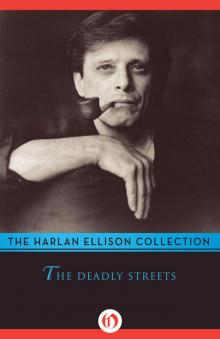 The Deadly Streets
The Deadly Streets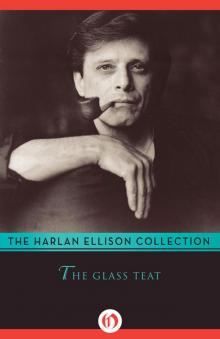 The Glass Teat
The Glass Teat Paingod and Other Delusions
Paingod and Other Delusions No Doors No Windows
No Doors No Windows Strange Wine
Strange Wine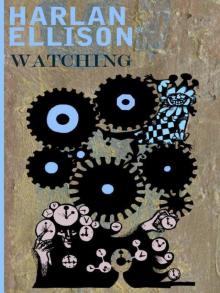 Harlan Ellison's Watching
Harlan Ellison's Watching Over the Edge/An Edge in My Voice
Over the Edge/An Edge in My Voice Troublemakers: Stories by Harlan Ellison
Troublemakers: Stories by Harlan Ellison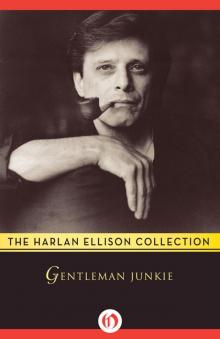 Gentleman Junkie and Other Stories of the Hung-Up Generation
Gentleman Junkie and Other Stories of the Hung-Up Generation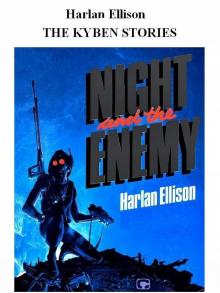 The Kyben Stories
The Kyben Stories From the Land of Fear
From the Land of Fear The Top of the Volcano: The Award-Winning Stories of Harlan Ellison
The Top of the Volcano: The Award-Winning Stories of Harlan Ellison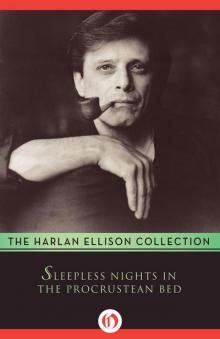 Sleepless Nights in the Procrustean Bed
Sleepless Nights in the Procrustean Bed Ellison Wonderland
Ellison Wonderland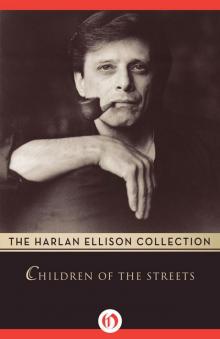 Children of the Streets
Children of the Streets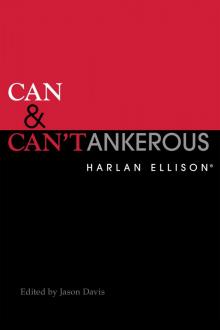 Can & Can'tankerous
Can & Can'tankerous Love Ain't Nothing but Sex Misspelled
Love Ain't Nothing but Sex Misspelled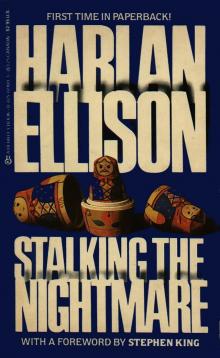 Stalking the Nightmare
Stalking the Nightmare Approaching Oblivion
Approaching Oblivion Deathbird Stories
Deathbird Stories Partners in Wonder
Partners in Wonder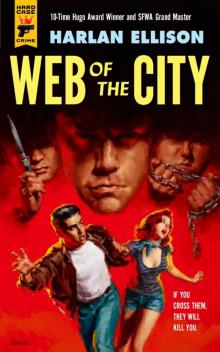 Web of the City
Web of the City Spider Kiss
Spider Kiss A Boy and His Dog
A Boy and His Dog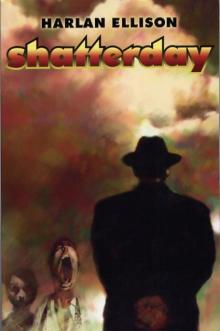 Shatterday
Shatterday Slippage: Previously Uncollected, Precariously Poised Stories
Slippage: Previously Uncollected, Precariously Poised Stories Repent, Harlequin! Said the Ticktockman
Repent, Harlequin! Said the Ticktockman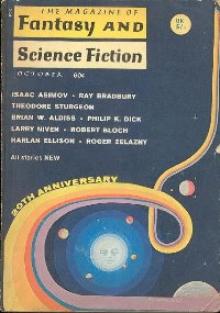 Come to Me Not in Winter's White
Come to Me Not in Winter's White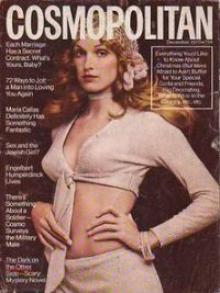 The Song the Zombie Sang
The Song the Zombie Sang The Other Glass Teat
The Other Glass Teat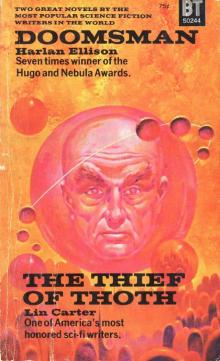 Doomsman - the Theif of Thoth
Doomsman - the Theif of Thoth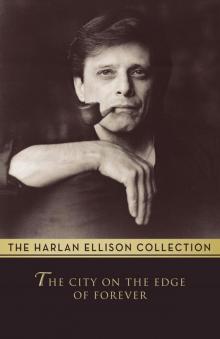 The City on the Edge of Forever
The City on the Edge of Forever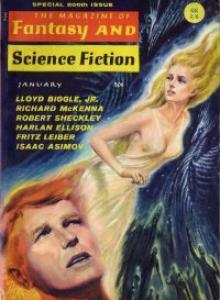 I See a Man Sitting on a Chair, and the Chair Is Biting His Leg
I See a Man Sitting on a Chair, and the Chair Is Biting His Leg The Harlan Ellison Hornbook
The Harlan Ellison Hornbook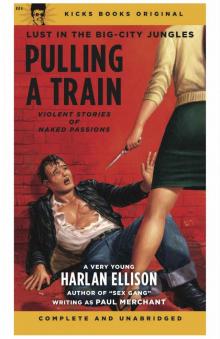 Pulling A Train
Pulling A Train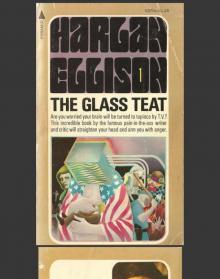 The Glass Teat - essays of opinion on the subject of television
The Glass Teat - essays of opinion on the subject of television An Edge in My Voice
An Edge in My Voice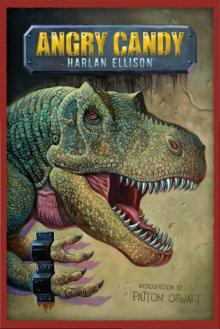 Angry Candy
Angry Candy Troublemakers
Troublemakers The Top of the Volcano
The Top of the Volcano Over the Edge
Over the Edge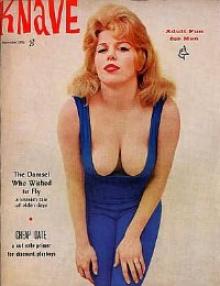 Survivor #1
Survivor #1 Slippage
Slippage